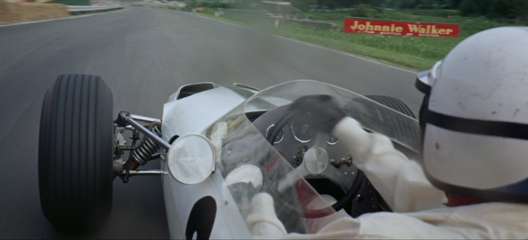Grand Prix (1966)
directed by John Frankenheimer
Frames in this review are taken from the two-disc Warner Brothers DVD,
released in July 2006.
Grand Prix is the showpiece film for Formula One racing and a
cult favorite in the racing community. It shows historical racetracks
from Formula One’s early days that no longer exist, and pioneered the
in-car race footage that is now a staple of television footage. Yet
despite its niche position in the market, the film is actually quite
accessible even to someone whose only contact with racing comes from
channel-surfing.
In a way, Grand Prix is the best Arthur Hailey film ever made,
even though it's not based on an Arthur Hailey novel. It brings in a
Grand Hotel -esque cast of characters, spins them around in a
blender, and spits them all out into a spectacular climax. And, unlike
that stillborn Arthur Hailey 70mm spectacle
Airport
-esque cast of characters, spins them around in a
blender, and spits them all out into a spectacular climax. And, unlike
that stillborn Arthur Hailey 70mm spectacle
Airport , Grand Prix requires no artificial action
beyond what happens in the normal course of a race. The expert camera
work and careful editing give the live-action racing sequences a thrill
that is impossible to achieve with special effects.
, Grand Prix requires no artificial action
beyond what happens in the normal course of a race. The expert camera
work and careful editing give the live-action racing sequences a thrill
that is impossible to achieve with special effects.

Formula One racing
The reason to watch this film is for the racing. The surrounding plot is
close to soap opera and is not that interesting. Fortunately, the racing
scenes are spectacular and absorbing, shot from inside the cockpit, in
the air, along the track, in a chase car, pretty much everywhere that a
camera can go. The fact that most of it was shot in real life with the
cars traveling at high speeds gives it a very authentic look, and some of
it comes from actual Formula One races. The excitement is enhanced by
the editing, with frenetic cutting juxtaposed with longer sequences that
provide the viewer with situational awareness of the larger race.
[...]